 Recently I had a very interesting conversation, which set me thinking. I’m 28 and I’m only now finding my feet when it comes to confidently communicating ‘verbally’. By this, I mean communicating with those who don’t know me, or who haven’t met an AAC user before. I’ve always put myself forward but I’ve had to learn through life to deal with constant communication knockbacks. By this I mean being ignored, or spoken over. Even to be spoken about as if I didn’t exist. Or to start to reply to a question and have the other person walk away. Sadly, even to be spoken to as if I am 3 years old. In my mind, there is a big difference between communicating with competence and confidence outside of our comfort zone.
Recently I had a very interesting conversation, which set me thinking. I’m 28 and I’m only now finding my feet when it comes to confidently communicating ‘verbally’. By this, I mean communicating with those who don’t know me, or who haven’t met an AAC user before. I’ve always put myself forward but I’ve had to learn through life to deal with constant communication knockbacks. By this I mean being ignored, or spoken over. Even to be spoken about as if I didn’t exist. Or to start to reply to a question and have the other person walk away. Sadly, even to be spoken to as if I am 3 years old. In my mind, there is a big difference between communicating with competence and confidence outside of our comfort zone.
The realisation was that whilst I have been a competent communicator for many years, I have not always been a confident communicator in some scenarios. And, this is nothing to do with my AAC skillset.
I always get my message across
I’ve always seen myself as a good communicator, because I get my message across, eventually. I take whatever steps I need to make my communication partner understand. But often this is at home or in a safe environment. These are places where I know I will have empathetic and positive communication support. This is with people who know the challenges I face. These are often individuals who will have received communication partner training and will show patience and understanding of my needs.
Growing up if I got frustrated trying to get my message across I often said “never mind”. Mum would always respond that the fact I had tried meant that it was important not to give up. She said it was essential I was heard. This meant she would always wait and facilitate what I wanted to say. I’ve discovered this is a rare and usually learned skill.
In new situations, it is often easier to say nothing than find the conversation has moved on before you can prepare a contribution. And, it is hard work to always tell others to stop, and wait, so I can have a say. If I have a personal assistant along they are trained to support my contribution. They might say “hold on a moment, Beth has something to say” which gives me chance to prepare my input. But even that doesn’t always work.
The result of nerves or stress on using AAC
If I’m nervous or stressed about ‘speaking’ spontaneously it means my body tenses. The result is my muscles don’t work as they might do normally. Suddenly something I can do at home with ease takes 10 times longer. Being tense makes it harder to control my gross and fine motor function to use my kit. Making my finger point at the right little box on a screen, or being accurate with a stylus, becomes a huge physical task. For instance at my first university review meeting with a lot of strangers trying to make my point I was less than ‘fluent’ in my communication. My body went into spasm, I could barely touch my communication aid and the more I was concerned the worse this got. This then led to me worrying I would be judged on appearances rather than what I was capable of demonstrating in normal circumstances.
New situations can be tricky
Each time we meet a new person or are in a new situation, however much we want this to go well there are often unexpected wobbles. My way of dealing with this now is to take the time to plan and prepare for situations. I think about where we are going, who we will see, what I might say, what similar situations I’ve encountered before. Where possible I might discuss these with the Personal Assistant who will be with me so they know what I’m thinking.
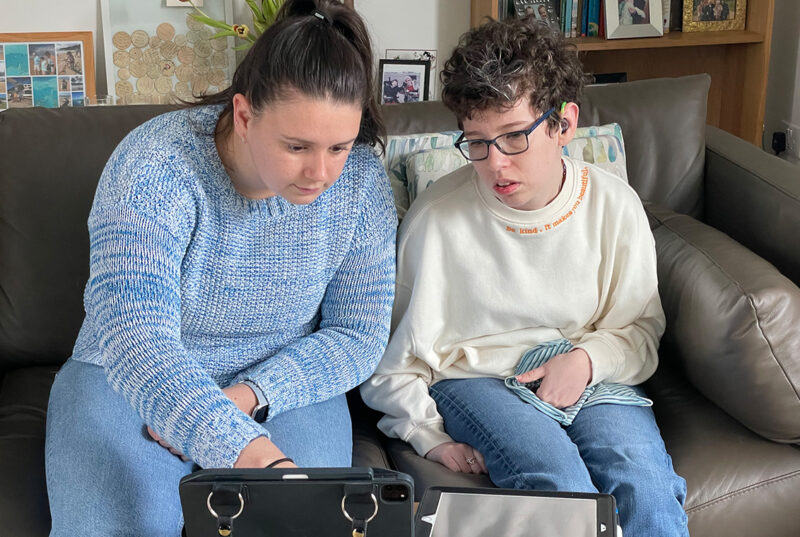 Strategies to aid competence and confidence…..
Strategies to aid competence and confidence…..
Over time I’ve developed strategies to make sure I can say what I need with my communication aid. Pre-planning gives me confidence. When it comes to more formal settings this might include:
- Background reading before meetings and preparing possible contributions (which might need to be amended in real-time).
- Discussing the topic with someone else beforehand to help formulate my views which makes programming quicker.
- Preparing a brief statement of my views by anticipating potential topics that may come up. It doesn’t mean I have to use it!
- Pre-programming any questions relevant to the event or topic, even if I don’t use them.
- Formulating a brief chronology of events and evidence (useful for a medical appointment).
- It also helps to be sat in a well-supported chair which minimises unwanted body movements.
It may well be that as you read this you are thinking that’s what I do. This might be in your head, or by making brief notes, or by chatting over coffee with a friend. When you come to verbalise then you ad-lib around the subject to make your point spontaneously. For a communication aid user, the speed of output as we programme means communication spontaneity can be lost.
There is a tricky balance, especially in group situations. I don’t want everyone thinking they have to all stop their normal conversation, wait and hang on to my every word, that doesn’t happen for them. I’m not asking to be the centre of attention, I just want to be heard. With people I work alongside or meet with regularly I’ve found giving them some basic guidelines on how to support my communication seems to be helpful.
…..and resilience
Making communication work well relies on my own resilience, competence and confidence. Plus the feeling I have a contribution worth making, and that others will want to hear my views. That even if I am not successful the first time in getting my message across that I will have another go. I know no one intentionally puts me down, because the things I experience I also see happening to those with speech at times. Everyone gets talked over sometimes.
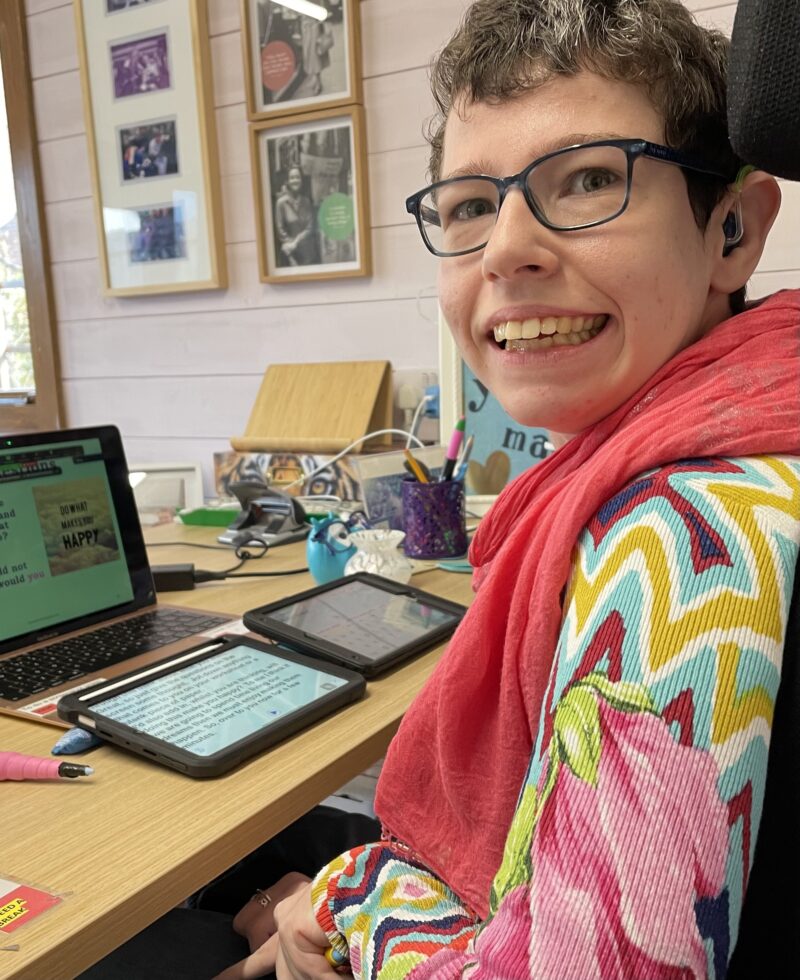 Having confidence in my device
Having confidence in my device
The other thing I’ve done is completely re-organise my communication software to meet my needs. In fact, I’m constantly tweaking the programming. As a result, I have relevant contributions stored in an easily accessible way that supports me being spontaneous when I want to be. This means my programming works for me because it has been driven by my brain, not the way a software developer thinks I might work. Being effective in using my equipment at least makes me more confident and relaxed about communicating because I know the tech will work.
Within the software I have stored lots of different shortcuts and abbreviations to answer questions I get asked regularly more quickly.
Building confidence takes time
My big reflection from all this is that I came out of school 9 years ago as a competent communicator. I was willing to try and put myself out there, knowing I wouldn’t always get heard. I didn’t believe I was scared to have a go. With life experience today I usually feel like I have the confidence to speak out in most situations. I now know everyone is different but I question what more could have been done in my teenage years to facilitate the confidence needed to deal with life? School is a place to grow and thrive. This becomes a dichotomy, should we communicate only in safe and supportive surroundings, with good people around us? Should, or could there have been exposure to more challenging communication environments?
Presume competence
What I would be asking of a communication partner is that you go into every interaction with an AAC user presuming competence. I believe it’s important to treat each individual as someone who can understand the nuance of language. Only then if you, and they struggle, should you change the language you are using, but never the tone.
Find what works for you
These days I often take 2 communication devices to events. One that has pre-programmed speeches for presentations and delivering workshops. The second to use for spontaneous speech. I recognise with a dedicated expensive device this might not be possible, but using a software package on an iPad has become an easy fix.
Competence does come before confidence, practice is essential. Functional competence and confidence come from practice. In every situation. Learning life skills needs to go hand in hand with communication.
If you have ideas and suggestions on what might help develop competence and confidence communication for those who use AAC I would love to hear from you. You can email me via bethmoulam@aol.com

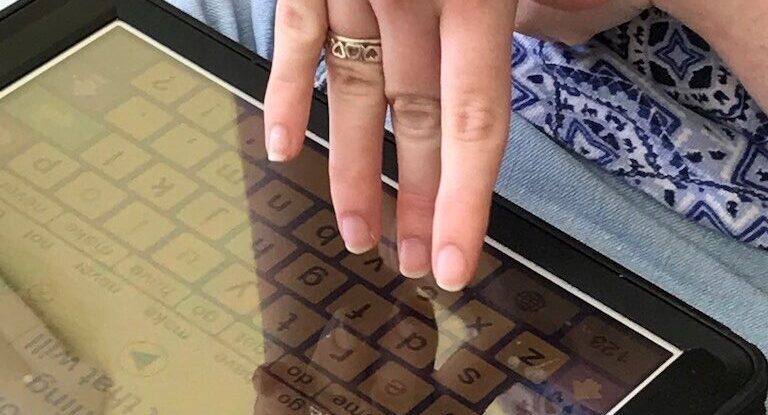
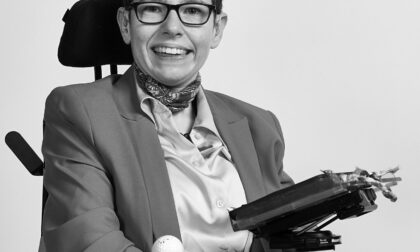
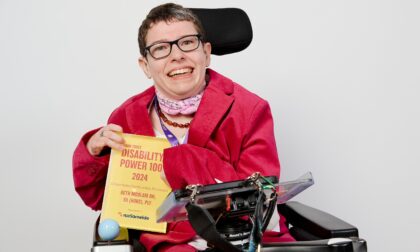

Hi Beth, I’m an OT working in AAC /AT. I am thrilled to have found your blog. I learn so much from each post from your reflections, insight, wisdom and practical suggestions. Thank you .
Hi Ania
I’m always delighted when someone finds my blog useful. Thanks for your lovely comments.
Beth